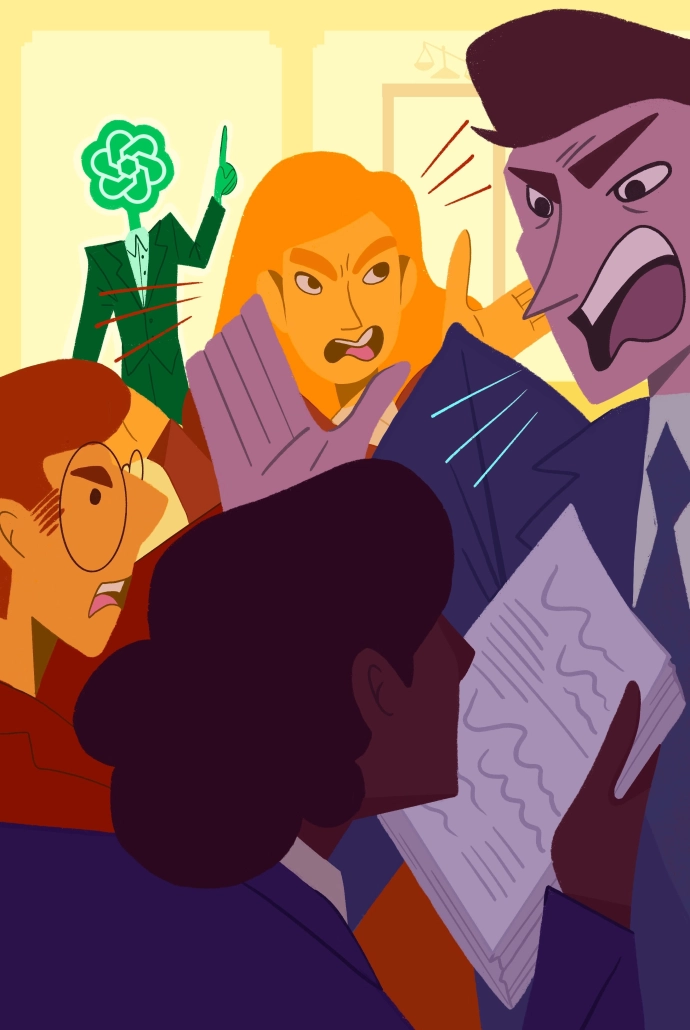LAW & DISORDER
ChatGPT will never be Elle Woods
If you think AI will get you out of legal issues, you need a better lawyer.
If you think AI will get you out of legal issues, you need a better lawyer.


Since its first release last November, ChatGPT and other large language models have been the talk of the town. While artificial intelligence has left some dumbfounded by its brilliance, others are concerned about the potential abuse of AI and its perceived threat to various professions.
A June 2023 study conducted by McKinsey & Company revealed that generative AI could potentially contribute up to $4.4 trillion annually to the global economy. In such a competitive market, intelligent systems allow companies to cut costs and increase efficiency. It’s almost too good to give up.
As Harvard Business Review writers David De Cremer and Garry Kasparov put it, “it seems like there’s nothing that can’t soon be automated, meaning that no job is safe from being offloaded to machines.”
You can’t avoid the fact that AI is becoming a ubiquitous presence in our rapidly evolving world. Just like the steam engine that kick-started the Industrial Revolution in the late 18th century, AI is transforming industries and how we work. It’s even influencing how we approach the practice of law.
With its ability to process vast amounts of data, perform legal research in seconds and even create legal documents online, law firms won’t need first-year associates to pull all-nighters to obtain case information. What I don’t see anytime soon is AI taking over as lawyers.
So when I saw Yahoo Finance writer Vishesh Raisinghani’s headline, “’Do not go to law school’: This fund manager warns the legal field is in ‘big trouble’ — as folks are using ChatGPT for complex contracts. Is it time to get into the trades?” I was taken aback.
While changing our approach to legal issues is one thing, completely offloading this field onto AI is a completely different idea — one that is not quite feasible. Even with the most powerful computers and calculators, mathematicians still exist. While AI is evolving, so are we — AI was never meant to replace us, it was meant to assist us and help us grow.
It’s not just Raisinghani, though. In an interview with CNBC, founder and managing partner of Bedrock Capital Geoff Lewis stated, “Do not go to law school. I hope my lawyers aren’t watching this, but I think the legal field is in big trouble. That is going to be one of the first to get disrupted by AI.” He continued, saying “I talk to folks who spend tens of thousands of dollars a week on legal bills. They’re already using ChatGPT to generate complex contracts. I think the legal field is in for a lot of trouble.”
But don’t take Lewis’ words to heart — you should still study for the LSAT. AI is no reason to give up on a career in law. The future is uncertain, and perhaps Lewis and Raisinghani are right. Maybe there will be a robot uprising and lawyers will become obsolete. But is that a world we want to move toward?
AI-based machines excel in speed, accuracy and consistent rationality. However, they lack the intuition, emotions and cultural sensitivity that human beings are capable of, making us uniquely effective — especially in the field of law. Apart from the tasks of deciphering statutory law and staying updated on legal precedents, I’m skeptical that AI can accurately construe and apply the law in alignment with a client’s specific requirements and needs.
Legal cases often require high emotional and ethical reasoning that allows lawyers to build trust and rapport with clients. In the wise words of Elle Woods, “You must always have faith in people. And, most importantly, you must always have faith in yourself,” and I’m not sure I can fully have faith in AI’s legal abilities.
There’s a reason why lawyers get paid so much. Lawyers might be expensive to hire, but I think the price is more worth it than paying for ChatGPT premium — only to have it respond with something along the lines of, “I don’t have personal thoughts or opinions as I am just a computer program … However, I can provide you with some general information.”
While AI is a powerful tool that has unthinkable potential, AI is meant to help us, not replace us. This goes for every industry in the world — including law. If you’re thinking of using ChatGPT for writing up a contract, maybe hire a lawyer before you send it off. Humans aren’t perfect, and, as the product of humans, AI isn’t, either.
Helen Nguyen is a graduate student writing about law and social issues in her column, “Law & Disorder.” Her column, “Law and Disorder,” runs every other Wednesday.
We are the only independent newspaper here at USC, run at every level by students. That means we aren’t tied down by any other interests but those of readers like you: the students, faculty, staff and South Central residents that together make up the USC community.
Independence is a double-edged sword: We have a unique lens into the University’s actions and policies, and can hold powerful figures accountable when others cannot. But that also means our budget is severely limited. We’re already spread thin as we compensate the writers, photographers, artists, designers and editors whose incredible work you see in our daily paper; as we work to revamp and expand our digital presence, we now have additional staff making podcasts, videos, webpages, our first ever magazine and social media content, who are at risk of being unable to receive the compensation they deserve.
We are therefore indebted to readers like you, who, by supporting us, help keep our paper daily (we are the only remaining college paper on the West Coast that prints every single weekday), independent, free and widely accessible.
Please consider supporting us. Even $1 goes a long way in supporting our work; if you are able, you can also support us with monthly, or even annual, donations. Thank you.
This site uses cookies. By continuing to browse the site, you are agreeing to our use of cookies.
Accept settingsDo Not AcceptWe may request cookies to be set on your device. We use cookies to let us know when you visit our websites, how you interact with us, to enrich your user experience, and to customize your relationship with our website.
Click on the different category headings to find out more. You can also change some of your preferences. Note that blocking some types of cookies may impact your experience on our websites and the services we are able to offer.
These cookies are strictly necessary to provide you with services available through our website and to use some of its features.
Because these cookies are strictly necessary to deliver the website, refusing them will have impact how our site functions. You always can block or delete cookies by changing your browser settings and force blocking all cookies on this website. But this will always prompt you to accept/refuse cookies when revisiting our site.
We fully respect if you want to refuse cookies but to avoid asking you again and again kindly allow us to store a cookie for that. You are free to opt out any time or opt in for other cookies to get a better experience. If you refuse cookies we will remove all set cookies in our domain.
We provide you with a list of stored cookies on your computer in our domain so you can check what we stored. Due to security reasons we are not able to show or modify cookies from other domains. You can check these in your browser security settings.
These cookies collect information that is used either in aggregate form to help us understand how our website is being used or how effective our marketing campaigns are, or to help us customize our website and application for you in order to enhance your experience.
If you do not want that we track your visit to our site you can disable tracking in your browser here:
We also use different external services like Google Webfonts, Google Maps, and external Video providers. Since these providers may collect personal data like your IP address we allow you to block them here. Please be aware that this might heavily reduce the functionality and appearance of our site. Changes will take effect once you reload the page.
Google Webfont Settings:
Google Map Settings:
Google reCaptcha Settings:
Vimeo and Youtube video embeds:
The following cookies are also needed - You can choose if you want to allow them:
